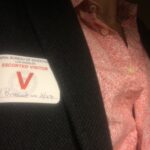Before I became a journalist and joined the transparency community, I worked for subcontractors hired by the Intelligence Community. I thought the system could be fixed if the right people showed up, and then left when I became disillusioned. None of this has been a secret, it was part of my Twitter profile years ago, and I’ve brought it up in interviews and posts over the years, but I don’t like talking about it for a few reasons.
- It’s almost impossible to accurately convey because of how people view the industry. Like a lot of jobs, it was both more and less interesting than it sounds.
- I’m afraid I’ll leave something out. No matter how thorough I try to be, I can’t possibly cover every base and include every detail. Memories fade, and what might seem interesting to others in retrospect was just a Tuesday for me. It was a day job.
- Some people will hear the opposite of whatever I say, whether it’s denying a non-existent connection, putting something in perspective as mere trivia, or mocking conspiracy theories.
- It’s extremely unpleasant to dwell on past mistakes. While I learned a lot, thinking that the system could be salvaged if the right people showed up was undeniably a mistake.
So what did I do? I was a subcontractor, which means when either the government or a corporation would hire a contractor, I was an outsider that they could hire to help work on it. It’s the equivalent of working freelance or the gig economy, but for a different industry than what people usually think of. Most of my work was for companies that you’ve never heard of, with the sole exception being some forecasting and editing work for Wikistrat, though most of my work was for a small firm focused on countering wildlife trafficking.
A lot of that work is covered by NDAs, but I’ve never held or been subject to a security clearance of any sort. To my knowledge, I’ve only contributed to one classified project and my work on it was entirely unclassified. In general terms, it related to the mitigation of IEDs. At the time, I thought it was justifiable because it shouldn’t have led to any foreseeable harm. In the decade since, I’ve come to understand that any contribution to the American war machine can and will be perverted.
I’ve never been part of or worked directly for any branch of government or the armed forces. However, I knew and performed some minor work for a former Army intelligence chief about 30 years after he left the military. I studied counterintelligence at the American Military University, which despite the name and specialization is a public university. On occasion, I informally worked with a colleague who was a military contractor.
I never worked on any projects targeting leakers or whistleblowers, and I wasn’t involved in Wikistrat’s 2016 election scenario. In October 2012, I helped LeakyMails when they faced government censorship in Argentina. I published their materials on the server I had rented from PRQ so there was a stable place for people to access it. To this day, their material is indexed on DDoSecrets. I also sanitized and published some of my own work through Cryptome, including a presentation about the risks in 2015 to whistleblowers if they relied solely on Tor.
I left over concerns for source safety and bureaucratic obstruction that arose from my work involving a World Bank project, and have since become further disillusioned over surveillance, police militarization, and expansion of the military.


